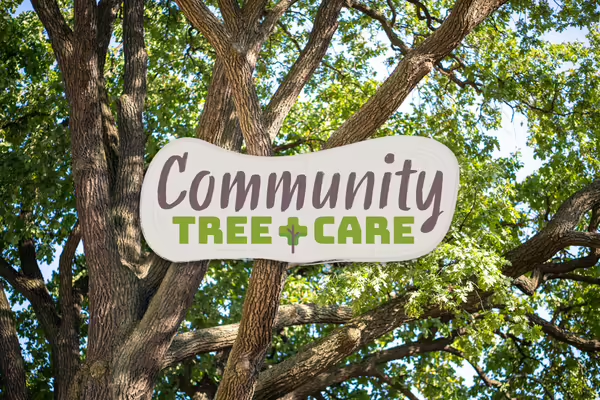
URBANA, Ill. — Trees are essential to nature’s landscape and our daily lives. Understanding and providing proper and routine maintenance is important to ensure their best life and healthier urban forest. Communities with healthy, viable trees are more likely to be impacted through improved air quality, reduced stress, and added levels of personal comfort for many.
“Many who care for trees are not certified arborists but carry out similar work in their backyards or communities,” says Ryan Pankau, University of Illinois Extension horticulture educator. “Understanding and teaching proper tree care techniques to more people will help more trees in our communities thrive.”
Illinois Extension’s Community Tree Care Series is back and ready to help everyone learn how to support tree health in their local landscapes. The hybrid series is a training opportunity for individuals performing tree care work and looking to build on their knowledge. Topics range from tree basics to identification, health assessment, and pruning techniques.
Participants include certified arborists as well as public and private tree care professionals, municipal or county groundskeeping staff, community volunteers, and anyone interested in expanding their tree care knowledge. This training provides information and resources for communities to ensure proper tree care, minimize the risk of hazardous trees, and promote healthy community forests.
The hybrid model provides two forms of training, which offer online webinars and in-person workshops. First are six winter webinar sessions from 9 to 10:30 a.m., spanning two Wednesdays a month from January through March. Each webinar covers two main topics per date. The cost is $10 for general access to all sessions and $50 for those seeking Continued Education Units for access to all sessions. Registration is required, and individuals can attend one, some, or all sessions.
One hour of CEUs is available per session to Illinois Arborist Association certified arborists who qualify. During registration, please specify attendance as a certified professional seeking CEUs. Webinar topics include:
- Site and Species Selection and Construction Damage | Jan. 15
- Planting and Improper Practices | Jan. 29
- Tree Identification and Health Assessment | Feb. 12
- Abiotic and Biotic Stressors | Feb. 26
- Pruning Methods and Benefits of Trees | March 12
- Diversity and Advocacy and Choosing Nursery Stock | March 26
New this year — each webinar session will conclude with a discussion of tree health issues based on attendee-submitted photos. The activity will allow time for skill building, discussion, and learning from each other using relevant examples of things happening to trees throughout the state.
The second training opportunity includes in-person tree care workshops in fall 2025. The exact dates, locations, and registration will be available to participants following the webinar sessions.
Illinois Extension Horticulture Educators Sarah Vogel, Emily Swihart, Ryan Pankau, Chris Enroth, Forestry Specialist Justin Vozzo, and Program Coordinator Jenny Lee teach the series.
To register, visit go.illinois.edu/TreeCareSeries. If you need a reasonable accommodation to participate in this program, contact Emily Swihart at eswihart@illinois.edu, 217-333-1677. Early requests are strongly encouraged to allow sufficient time to meet your access needs.
SOURCES: Sarah Vogel, Emily Swihart, and Ryan Pankau, horticulture educators, Illinois Extension; Jenny Lee, program coordinator, Illinois Extension.
WRITER: Jenna Braasch, Media Communications Coordinator, Illinois Extension
University of Illinois Extension develops educational programs, extends knowledge, and builds partnerships to support people, communities, and their environments as part of the state's land-grant institution. Extension serves as the leading public outreach effort for University of Illinois Urbana-Champaign and the College of Agricultural, Consumer and Environmental Sciences in all 102 Illinois counties through a network of 27 multi-county units and over 700 staff statewide. Extension’s mission is responsive to eight strategic priorities — community, economy, environment, food and agriculture, health, partnerships, technology and discovery, and workforce excellence — that are served through six program areas — 4-H youth development, agriculture and agribusiness, community and economic development, family and consumer science, integrated health disparities, and natural resources, environment, and energy.